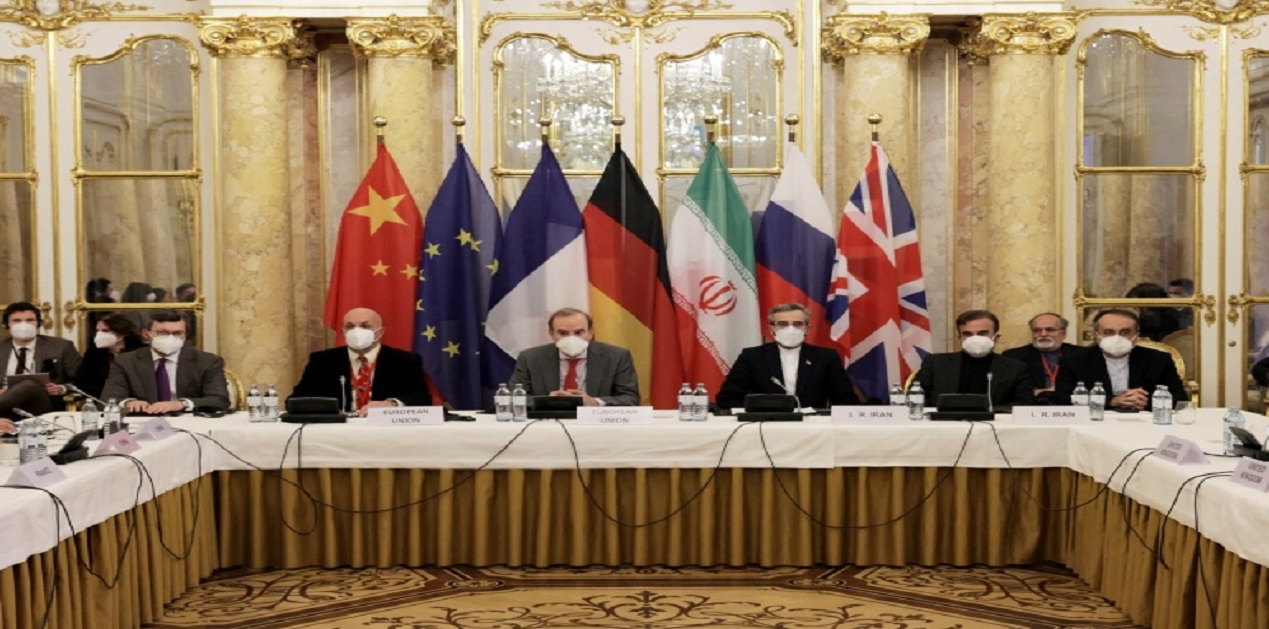The eighth round of talks on Iran nuclear deal between Iran and the P5 plus1 countries has been on in Vienna since 27th December last year. Shuttling between the Iranian camp and the US, the delegates of other P5 plus1 countries have been trying to plug the gaps and come up with a deal, acceptable to all sides, especially Iran and the US. It may be recalled that the Iran Nuclear Deal was revoked unilaterally by the US under President Trump in May 2018, calling it the “most horrible deal ever”. Talks to revive the deal and restore the JCPOA, as the deal is called, began in right earnest only in April 2021, soon after Joe Biden took over as the US president. Seven rounds have been held so far, with the US and Iran interacting indirectly through the delegates of other countries.
Just as signals indicating a possible thaw on a possible nuclear deal between the key parties, Iran and the US had started emerging the crisis in Ukraine took over the global attention and this could have major and direct repercussions on a possible nuclear deal with Iran.
The Nuclear Deal Talks
The eighth round of talks has been the longest so far. On 28th January, after a month long deliberations, the talks were paused for participants to ‘go back to capitals for consultations’. Both sides agreed that the technical part is largely over and now it requires ‘political decisions’. Just ahead of talks resuming in first week of February, the US restored a sanctions waiver to Iran which allowed Russian, Chinese and European companies to carry out non-proliferation work at Iranian nuclear sites. While some critics sounded alarm at the US conceding, the US clarified that it was a technical clause required to work towards a final deal. Iranian Foreign Minister Hossein Amirabdollahian welcomed the announcement with cautious optimism, stating that lifting of some sanctions can, translate into American goodwill but what happens on paper is good but not enough. He added that one of the “main issues” in the nuclear talks is obtaining guarantees that the US will not withdraw from the 2015 deal again.
The French Foreign Minister Jean-Yves Le Drian struck an optimistic note when he informed the Parliament on 16th February that the deal is in sight and stated that "We have reached tipping point now. It's not a matter of weeks; it's a matter of days." He added that now political decisions are needed from the Iranians. The Iranian lead nuclear negotiator Ali Bagheri Kani responded acknowledging that they are closer than ever to an agreement; but nothing is agreed until everything is agreed, further asking the parties to the negotiations "to be realistic, avoid intransigence and heed lessons of past four years”. Shortly thereafter, the Iranian Parliament on 20th February, passed a resolution laying down demands for a deal to happen, key among them being a guarantee by the US that it will not abandon the nuclear deal again and all sanctions imposed under “false excuses” must be lifted.
Although no inputs are available on the specifics of draft deal almost agreed upon, it seems that it will mirror the JCPOA of 2015. The implementation of the deal, as and when it comes through, will be the key as Iran will wait for revoking of sanctions, unlocking of its accounts and unfreezing of its assets before scaling back the nuclear programme in any way. Release of Western prisoners by Iran could be a symbolic gesture to signal their positive intent and a definite precondition of the West.
The Ukraine Crisis
Just as there was a buildup on a possible announcement on closure of deal, the simmering crisis in Ukraine exploded into a full blown crisis on 22nd February with Russia initially announcing and recognizing the two breakaway regions in Eastern Ukraine as independent countries and thereafter launching a ‘special military operation’ in Ukraine in the early hours of 24th February. There has been widespread condemnation of Russia including at the UN Security Council and expectedly a variety of economic sanctions have been promptly imposed by the US, EU countries and others. Germany announced cancellation of certification of the Nord Stream 2 gas pipeline which would have provided natural gas to Germany, resulting in potential loss of billions of dollars to Russia.
The rapidity and the intent of Russian military and diplomatic offensive has taken the US and NATO by surprise. Although the US and the UK had earlier announced that any invasion by Russia into Ukraine would invite punitive measures, however, now that Russia called the bluff and actually launched the military operations, there appears to be a sense of uncertainty and indecision in the NATO and EU. A military operation by NATO against Russia could result in a full scale war, which may not remain confined to Ukraine thereafter.
The US Dilemma
Amidst all this, the US finds itself in a deep quandary. The pullout from Afghanistan last year resulting in the Taliban overrunning Kabul on 15th August is still fresh in public memory. Iran Nuclear deal is a case of ‘almost there’. The US may have gambled on the deal as the situation stood on 21st February. The release of western prisoners and scaling down of Iran’s nuclear programme could have been projected as a win-win situation despite huge moral victory for Iran. However, with Ukraine crisis blowing into a full scale conflict, any gamble or compromise on Iran might make the US look weak. Key to a nuclear deal is a guarantee sought by Iran from the US, possibly though the Congress, that US will not pull out of the deal in future and this is most unlikely in the current situation. Three diplomatic disasters in less than a year and the US mid-term elections slated for later this year could prove disastrous for President Biden.
Conclusion
The current global situation presents an unprecedented diplomatic quandary for the West, especially for the US. By their own estimates, it is now or never for the Iran nuclear deal. If the deal is not finalized soon, Iran could well cross a critical threshold beyond which it would be well-nigh impossible to roll back its nuclear programme. A potential unilateral military action against Iran by Israel in such a scenario has the potential for disastrous consequences for the region. The US would again be forced to engage as a key player in such a scenario. The current situation therefore presents no good choices for the US and the Iran nuclear deal looks to have hit a big Ukrainian roadblock, with very little room for maneuver.
(The paper is the author’s individual scholastic articulation. The author certifies that the article/paper is original in content, unpublished and it has not been submitted for publication/web upload elsewhere, and that the facts and figures quoted are duly referenced, as needed, and are believed to be correct). (The paper does not necessarily represent the organisational stance... More >>
Image Source: https://www.aljazeera.com/wp-content/uploads/2022/02/2022-01-28T173953Z_1421914192_RC2EGR95A8K7_RTRMADP_3_IRAN-NUCLEAR-TALKS-EU.jpg?resize=770%2C513











Post new comment